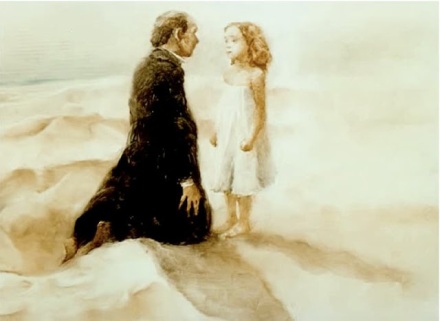“I say nothing of its being likely that nothing will exist for any one when I am gone, and that as soon as my consciousness is extinguished the whole world will vanish too and become void like a phantom, as a mere appurtenance of my consciousness, for possibly all this world and all these people are only me myself” (370).
Realizing he feels pity for another the little girl pulls the man back to reality, links him to society. This connection stops him from immediately severing himself from the world entirely. He says it seemed that “…the world somehow depended on me now” (370). But I find it ironic that despite feeling connected to another human being, instead of seeing the world as a place in which he interacts with others, the man sees only a projection of himself. I sympathize with this view; I think reality is unique for each individual. We may have objective physical experiences but the stories we tell ourselves about them shape what we believe to be true and how we act in the future. But does this mean that personal reality is all that exists? I may think you are a snobby person. It may be true, it may not, but if that’s what I believe and what I act on, does it matter if others think you’re nice? So all the people I know are, to me, only the ideas and opinions I have projected onto them. The world is a product of my judgements, of my imagination.
Having realized this, I feel more compelled to continuously question myself and refine how I judge things. I’m tempted to dive into Marcus Aurelius, Du Bois, Rosseau, and Montaigne for guidance on perfect thought and, from that, perfect action. Explorations of these authors usually clarify my world view, but the rabbit hole goes deep; it always ends at some irreconcilable philosophical question. I remember sitting down with my crisp, new Republic thinking, “Ah, pure logical thought! How beautiful, the effort of man to understand himself. Here I will find answers! Ah, here we go, Book 1, ‘What is justice?’….” A couple hours later I was tearing out my hair, frustrated with the conflicting debates, the abstract concepts that seemed to offer nothing to everyday living. My idealism was shattered. Philosophy at that point seemed an impractical business, fit only for old men in togas who have nothing better to do than drink Falernian wine and ruminate over metaphysics. They stick so stringently to chains of logic, to particulars—its suffocating! Where is the joy in unveiling life’s quandaries? It’s like plucking out your hairs one by one. They would rather define life than live it. The ridiculous man realized this ill,
“The consciousness of life is higher than life, the knowledge of the laws of happiness is higher than happiness—that is what one must contend against”( 383).
(Emphasis mine)
Indeed, close analysis of how we define moral concepts and manifest them is important; it grounds character and gives action clear direction. But there comes a point when we must realize that life is not just discovery; it is creation. As I said, the world is also a product of imagination. We have the power to change any situation by shifting our perspectives; “bend the Matrix” if you will. By staying open to possibility, we can grasp every opportunity.
I don’t think this conclusion is what keeps the ridiculous man’s hand off the trigger. He is awed by the beauty of what people were, yet tortured by what they’ve become. Still, it is the knowledge of possibility, that, “...in one day, in one hour everything could be arranged at once!” (383) that mystifies and attracts him. The ridiculous man sees the truth that, “…people can be beautiful and happy without losing the ability to live on earth” (382). He refuses to believe people are inherently evil. In an instant, chaos can become order, if only we choose. And really, is free will such a ridiculous dream?
Works
Dostoevsky, Fyodor. “The Dream of a Ridiculous Man”. Notes from Underground, The Double, and Other Stories. trans. Constance Garnett. New York, NY: Barnes and Noble Books, 2003. 365-383. Print.
Plato. Republic. trans. Benjamin Jowett. New York, NY: Barnes and Noble Books, 2004. Print.
